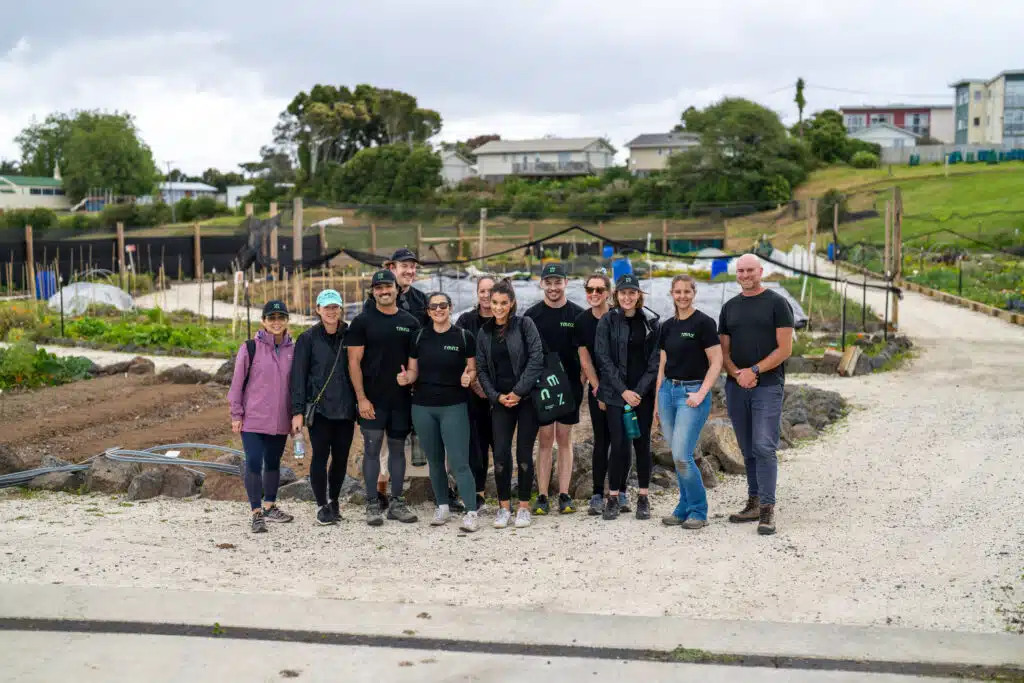“In the face of mounting environmental and climate crises, education has a key role to play in developing and sharing solutions that learn from and work with nature. Universities must adapt and innovate to respond to these challenges, to create new learning experiences and new ways to make research relevant for local communities. The AUT Living Labs grew out of a desire to radically rethink the roles and responsibilities of research and learning.”
Dr David Hall, Principal Investigator, AUT Living Labs
Planting a seed is but one step in growing a tree. Beyond sunlight and soil, a sapling requires tending and protection to grow.
This lesson in nurture can be applied to both trees and students at the Auckland University of Technology (AUT) Living Labs, as the programme fosters student learning, establishes meaningful partnerships and empowers young people with practical skills for climate action.
Living Laboratories is an AUT programme born from the vision of climate change policy researcher Dr David Hall, Prof Hannah Buckley and Assoc Prof Brad Case and taught by project-lead Jeff Silby. Established to see rangatahi nurture and grow a vision for a restored Aotearoa, the Learning from Nature initiative — as a part of their Living Labs programme — gives school students and staff the opportunity to undertake research while working with mana whenua on restoration projects.

Established in 2019, the programme transforms former agricultural sites into vibrant “Living Labs” that combine learning and meaningful restoration work — such as planting trees, monitoring growth, measuring the impact of weather patterns and learning about the different types of native plants that form a part of the unique ecosystems of Aotearoa. Their first site on Ngāti Whātua Ōrākei land in Pourewa serves as an outdoor classroom that connects people to nature by interweaving ecological science and mātauranga Māori.
With support from Whakatupu Aotearoa Foundation (funded by TMNZ), the Learning from Nature initiative aims to share knowledge not only about restoring ecological sites, but also to foster a deeper connection to the land. This shift from ‘living labs’ to ‘living classrooms’ will support students to become active, informed, and environmentally conscious citizens.
“For secondary school students, this is an opportunity for work experience, career development and transferrable skills – from simple skills of using a tape measure to using sophisticated tools like GIS integrated mapping. For younger students, the opportunity is to spark curiosity and passion for native species, to create exposure to our natural environment, and to increase familiarity with the mātauranga of our iwi and hapū partners.”
Jeff Silby, Project Lead and Teacher, AUT Living Labs
The project is also deepening the research and evidence base for Aotearoa-specific Nature-Based Solutions. With hands-in-the-soil experiments, they’re investigating how to restore native forests in a fast, cost-effective and risk-free way. This research directly addresses the objectives outlined in the New Zealand Government’s 2022 Emissions Reduction Plan and National Adaptation Plan, which highlight the importance of Nature-Based Solutions in protecting, restoring, managing and creating native ecosystems.
The Learning from Nature initiative also plays a crucial role in preparing students for the growing restoration economy. By offering education in Nature-Based Solutions, it equips students for careers in areas of restoration and regeneration. This will meet increasing demand for professional restoration and landscape design, as well as enhance the impact of voluntary and community-led restoration.
With start-up funding from Whakatupu Aotearoa Foundation, Jeff and the Living Labs team were able to extend the programme’s reach to primary and secondary schools, providing eco-educational experiences for over 650 students, 53 teachers and support staff, as well as 32 parent/community helpers. There is also ongoing development of an Educators’ Toolkit to extend programme learnings nation-wide.
AUT Living Labs represents a bold vision for the intersection of education and environmental stewardship. Catalysed by the support from Whakatupu Aotearoa Foundation, the programme’s Learning from Nature initiative continues to expand its reach and impact, having well surpassed their Year One target of 500 educational experiences. By integrating hands-on learning experiences, which interweave Western ecological sciences with mātauranga Māori, the programme is cultivating shared knowledge and future collaboration.
Ko te piko o te māhuri, tērā te tupu o te rākau.
The way in which the young sapling is nurtured (bent), determines how the tree will grow.